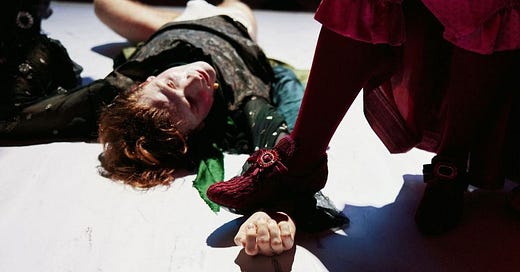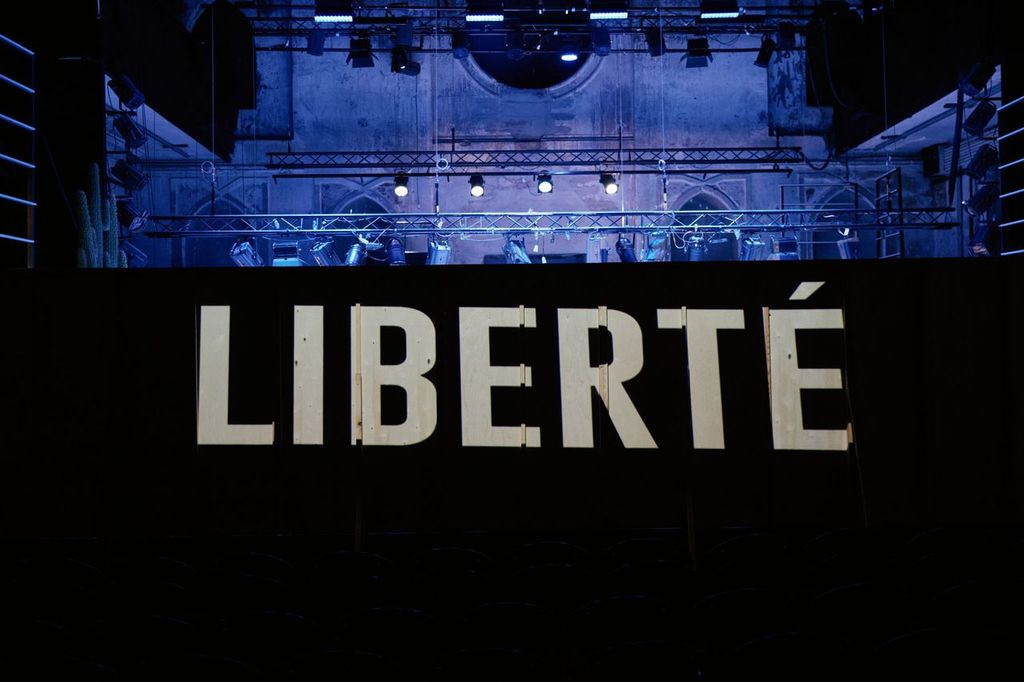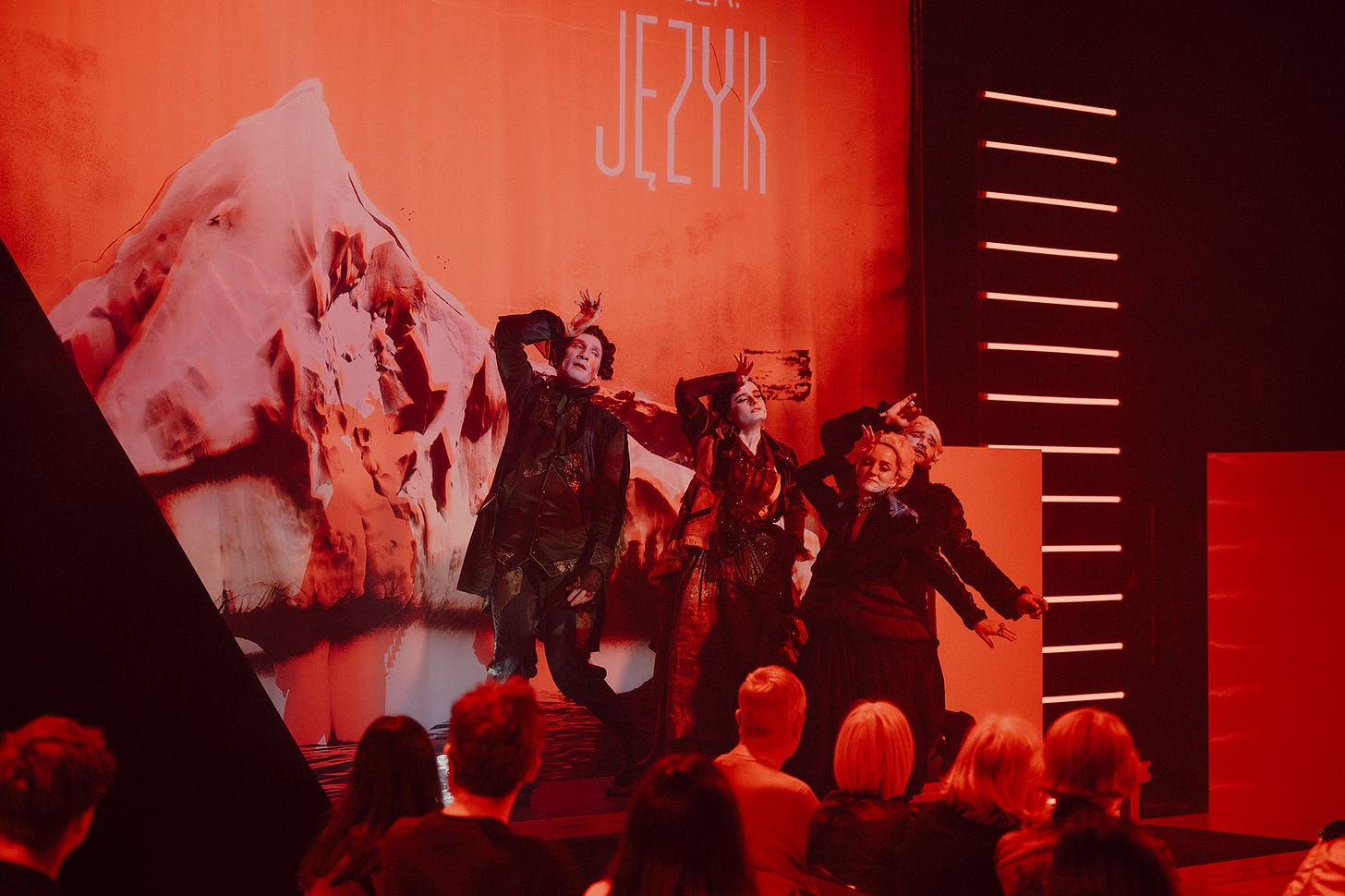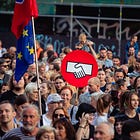A symbol of resistance: Theatre and protest in Georgia
On the campaign being waged against a Georgian theatre performance.
I’m in Vienna this week, for the Wiener Festwochen. This year’s festival, the second under the artistic directorship of Milo Rau, has been christened the Republic of Love. This week’s newsletter, however, is about recent events in Georgia, where people have been protesting since late last year. I feel like I’ve been writing variants on this story with increasing regularity over the last few months and, unfortunately, I think there will be more to come.
This is the part where I point out that if you want to support my writing and gain access to occasional paid subscriber bonus posts, you can do so for just £5 a month or £50 a year. Or, if that’s not doable - you work in theatre, I get it - just share this newsletter with someone you think might find it interesting. That helps too.
On 26th May, Georgia’s Independence Day, tens of thousands of people gathered in Tbilisi. They waved Georgian and EU flags, marking the 180th day of uninterrupted protests in the country. The current wave of pro-democracy demonstrations began in October last year after parliamentary elections said to be beset by voter irregularities.
Theatre has been at forefront of the movement and one performance, Liberté [trigger warning], which premiered six months ago at the Royal District Theatre in Tbilisi, has found itself at the centre of things. The show was always intended to be provocative, but it’s only in recent weeks that it has come under relentless attack from Georgia’s ruling Georgian Dream party – led by billionaire businessman Bidzina Ivanishvili - and the Patriarchate of the Georgian Orthodox Church who labelled it ‘blasphemous’. Pro-government TV channels have framed the play as an attack on Georgian values. Its makers have received threats.
Liberté [trigger warning] is a devised performance which connects the threads between the French and October Revolutions with contemporary global upheavals. It “examines how revolutions are articulated, how shame is deployed as a tool of political oppression, and how propaganda influences collective consciousness,” explains the show’s director Data Tavadze. “The show was a big statement - a kind of manifesto - and it has had this huge resonance, especially because of its timing.” It opened was on 30th of October, just four days after the elections. “It was time when society was absolutely numb. We felt defeated, and we didn't know how to continue after this rigged election,” he says.
The election results, coupled with the ruling party’s announcement in November that Georgia would suspend talks on EU accession until 2028, led Georgians to take to the streets in great numbers. This is the second wave of protests to grip the country in recent years, following the mass protests which took place throughout 2023-24 against the proposed “Foreign Influence" law, which it was believed would alienate Georgia from the West, as well as a new Anti-LGBTQ+ Propaganda Law.
Now, once again, the main avenue in Tbilisi is blocked by protestors daily. The authorities have responded with increasing brutality and mass arrests. Police now occupy Tblisi State University, once a symbol of resistance against Russian imperialism.
In December many theatres in Georgia embarked on one of the longest strikes in the country’s history. It lasted for 100 days, with several theatres even now continuing to take strike action. Students of the Theatre University staged an occupation demanding new elections and the release of detained protestors.
The current furore around the performance is not, says Tavadze, about its contents - though it is highly political - so much as what the play has come to symbolise. During some of the protests, quotes from Liberté [trigger warning] appeared on banners. “What else can we dream about as artists then to give words to people in resistance?” asks Tavadze, who has been very active in the protest movement.
Tavadze believes the government is now “targeting me and the theatre community because we have become one of the most consistent and vocal forces of resistance in Georgia.” Over the last months the theatre has played a central role in civil activism, he says. “We have succeeded in making our voices heard nationwide, so an attack on theatre today is an attack on the protest movement itself.”
As a result, theatre has come under attack on multiple fronts. “Actors have been some of the main speakers in this whole process and there have been consequences,” says Tavadze. While the campaign against the play has been particularly nasty, it is only one facet of a wider attack on culture. The Temur Chkheidze Studio for Playwrights, “the only space where which was focusing only on new Georgia drama and new Georgian writing” has been closed. As in Hungary, Slovakia and latterly Serbia, the heads of artistic institutions have been removed if they do adhere to the government line. Having transformed the Vaso Abashidze New Theatre with programme of politically and socially engaged work (which you can read more about in this article for SEEstage), David Doiashvil was sacked from his role as artistic director by the minister of culture earlier this year.
Actors have been arrested for participating in the protests. The popular actor Andro Chichinadze has been in prison for five months, accused with “organizing, leading, participating in, and publicly calling for violent actions”. Here’s the European Film Academy’s call for his release and, in this article for Nachtkritik, Tavadze lists the other artists who have been targeted by the regime.
“They're just postponing and postponing his trial to keep him there as long as possible,” says Tavadze. By holding him so long he believes “the regime is giving us a signal that no one is protected, no matter your privilege or popularity, nothing matters.” Chichinadze’s fame has not insulated him, quite the opposite. To protest is to risk arrest, or worse. “We are living in this nightmare,” says Tavadze.
When they resumed performing Liberté [trigger warning] after the strike, they knew it was likely to prove incendiary. “We knew what we were doing with this performance. We knew that we were putting our heads in the dragon's mouth,” he says. While the production is advertised as suitable for 18+ and there are lengthy trigger warnings, they took the precaution of putting stickers on the audience’s cameras as they entered. Later they decided to put people’s phones in sealed envelopes. “The ushers were like guard dogs ready to run towards anyone they saw filming,” says Tavadze. “Even though the performance is not that explicit, we knew how propaganda works, and that any five seconds from this show could be used against the actors, against us, and could be weaponized against the protests.”
Despite their best efforts, footage- both audio and video - of the performance featuring semi-clothed actors was obtained and widely circulated in a way intended to create a “tsunami of reaction.” This footage was broadcast on pro-government television channels on an almost hourly basis and some right-wing, openly pro-Russian groups started calling for violence towards the show’s creators. They received death threats. Tavadze’s home address was shared online.
Even though they called the police, pro-government thugs were able to throw eggs at audience members and to physically assault them. The Primakov Georgian-Russian Center organized a demonstration at the Royal District Theatre. The Georgian Orthodox church became involved. “They said that if we won't repent, they would excommunicate us - cut us off from the church,” he says. This was a dehumanising act intended to give a green light to extreme groups, says Tavadze. “We are no longer Christians in their eyes, and therefore somehow less than human.”
The government is now completely focused on suppressing the protests, he says. “In many ways it is defining the political process in Georgia. The government can only react.” On 17 May, the International Day against Homophobia, Transphobia, and Biphobia, the government announced a ‘Family Purity Day’ and the two groups- pro-Orthodox and conservative on one side and pro-European on the other – staged competing marches. The rhetoric around the protests has shifted, says Tavadze. “Now the government says that they're not only protecting Georgia and traditional values, on a metaphysical level they have become protectors of Christianity, and this is some kind of holy war.”
Liberté [trigger warning], says Tavadze, is now part of this historic movement in Georgia. “It has become one of the symbols of our resistance.” It is more than just a theatre performance in this sense, he says. “It is quite touching and emotional to see how many people were supporting us,” he says. In order to ensure the performance went ahead, people came to the theatre to protect it. “It's sad that we have to do this, but on the other hand, to see these famous actors, these amazing human beings, standing around the theatre to allow that performance to happen, this is something which gives you only hope. You cannot avoid being optimistic.”
The tactics of the government are dispiritingly familiar – we’re watching similar things play out, to a greater or lesser extent, in Slovakia, Bulgaria, Serbia, with the US enthusiastically adopting elements of the same playbook. Protests against the government are being equated with attacks against the nation. Divisions are being stoked, and culture is being framed as a battleground. At the same time resistance is not just on the streets, says Tavadze, “it's in every family. It's in every working place. It's in every kitchen. In every school. There is no space where this protest is not felt.”
The government’s propaganda machine is, however, still strong. “The FSB has plenty of experience in this, here and in different countries also.” While what’s happens in Georgia is part of its historic resistance against Russia, it is still “an incredibly dangerous fight.” Georgia has a collective memory of conflict with Russia and the propaganda taps into that. “I think if this resistance weakens one day, which I hope not, then there will be only fear and blood in the future.”
“During a war, you know who's the enemy, you know the rules. It's easier to recognize what is happening.” This is different, he says. It’s no longer even accurate to call it hybrid warfare.
While the West has placed some sanctions on Georgia, Tavadze feels there’s still a lack of understanding of the scale of what’s taking place in the country. “People don't know what is happening in Georgia. It is very important that they know. The West must not make another mistake, as they did with Ukraine, to underestimate what’s happening. We've seen this before. We've been overlooked before, and it didn't bring anything good to the West nor to the world.”
This is a partly a consequence of a restless and selective news cycle, not to mention the sheer volume of shittery going on in the world. Protest movements only tend to make headlines during moments of violence and volatility, or when unprecedented numbers are at hand. We don’t get to appreciate the long tail and slow burn of resistance, the day-to-day bravery involved in continuing to stand up even as the authorities clamp down. This engenders a sense of hopelessness.
You see the same thing in Serbia. While no protest has matched the 15 March in Belgrade in terms of numbers, the movement has not dissipated, it has evolved, changed tactics, but it has not stopped. However you wouldn’t know it from the already scant coverage afforded to it in the international press.
The world’s attention should be on the crises in this region, says Tavadze, because what happening here will spread. “They are coming, and they will come to the centre of Europe at some point, if we are not alert, and if we don't learn.” People need to understand, he says, that what’s happening in Georgia – and what happens in Slovakia and Serbia - is a kind of rehearsal for what will happen everywhere else. We need to understand that this is coming, and it will be big.”
This week in European theatre
A round-up of festivals, premieres and other upcoming events over the next seven days.
Biennale Teatro 2025 – Willem Dafoe is the guest director of the 56th edition of the international theatre strand of the Venice Biennale. Under the title Theatre is Body/Body is Poetry, the programme features performances from some of the most influential figures and companies in contemporary theatre including Romeo Castellucci, the Wooster Group and Dafoe himself. It runs between 31 May -15 June.
Maribor Theatre Festival - Launched in 1966 and taking place annually in the picturesque city of Maribor, the festival showcases the best Slovenian theatre of the previous year. Highlights of the 2025 programme include Sebastijan Horvat’s production of Lucy Kirkwood’s The Welkin and a production of Ödön von Horváths Casimir and Caroline by Nina Rajić Kranjac, fast-rising star of the Slovenian scene. The festival runs from 2-15 June.
Thanks for reading! If you have any feedback, tips, or thoughts about this newsletter, you can reach me on natasha.tripney@gmail.com









I'm still amazed at the lack of coverage re Serbia. Relative to the forensic focus of the 1990s, and noting its borders with EU member states.